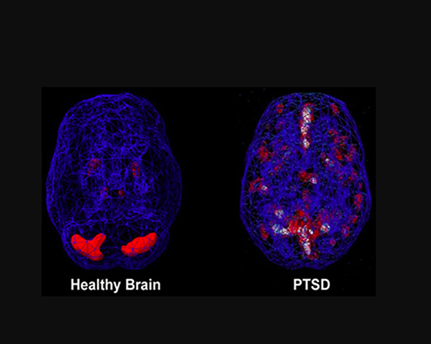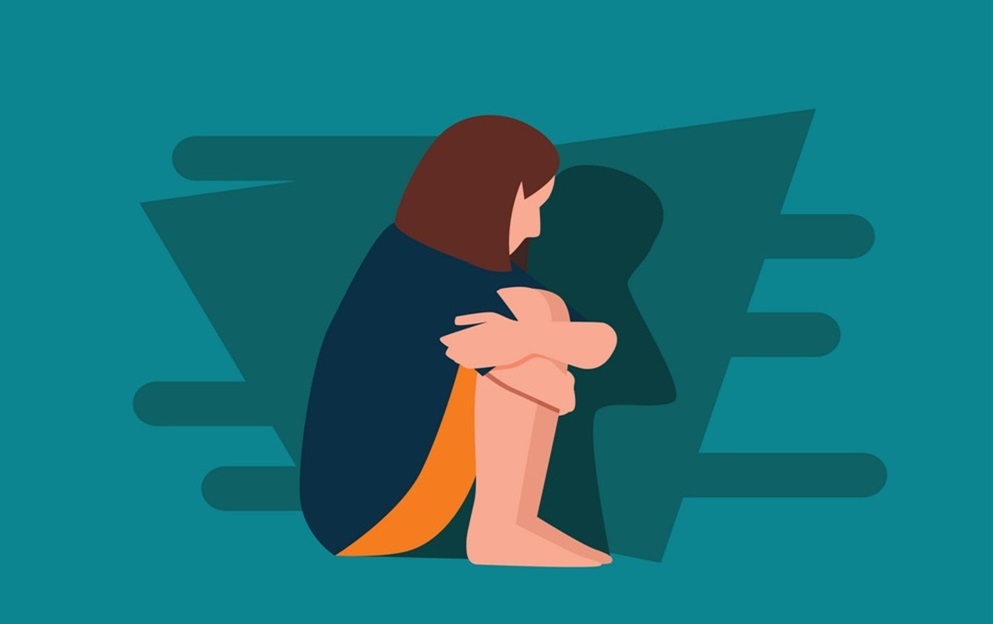
Author: Yara WHRD Center
I have never considered myself the smartest or brightest in class, but taking into account my educational background, I can confidently say that I was performing well. One aspect of which I have always been proud is my ability to quickly memorize information. I could read something and easily remember it, even recalling specific pages. This quality was particularly beneficial for my humanitarian major. However, everything changed for me after my arrest (because of my activism). I sensed a shift in my cognitive abilities, which I struggled to explain. Initially, I attributed it to the natural process of aging or the stress surrounding my arrest, but it turned out to be more than that. It wasn’t until I attended a conference that I discovered what had happened to my brain. A neuropsychologist presented two brain scan images, one from an individual who had experienced tremendous trauma and another from someone leading a normal life. Please take a look at the images below to understand the point I am trying to make.

When comparing these two pictures, it is important to seek the expert opinion to gain a comprehensive understanding of the differences between them. The image on the right represents someone who has experienced trauma and received a diagnosis of PTSD (post-traumatic stress disorder), while the image on the left depicts an individual who has not experienced past trauma or at least sever trauma to be diagnosed with PTSD. Even with a brief observation, it is evident that these two pictures are noticeably distinct.
It’s intriguing how, as activists, we often overlook the potential impact of trauma on our brains. When we face situations like arrests, solitary confinement, and subsequent release from prison, our immediate concerns tend to revolve around sharing the news with loved ones, maintaining relationships with friends, and even job security. We carry hidden wounds and scars that may not surface immediately after the traumatic event, and healing them may not be our immediate priority. However, over time, these hidden wounds can have a lasting impact on us, making it crucial to address the effects of trauma on our brains.
Understanding the Brain After Trauma
Trauma has profound effects on the brain, impacting various levels of functioning, from decision-making to subconscious responses. Overcoming trauma can be challenging because it affects multiple areas of the brain simultaneously.
According to a 2006 study by the National Institutes of Health (NIH), trauma primarily affects three key parts of the brain: the amygdala, the hippocampus, and the prefrontal cortex.
Amygdala
The amygdala, a small but significant brain region, has a crucial function in handling emotions and memories. It aids in the identification and reaction to various emotions, including fear and happiness. Additionally, the amygdala assists in retaining memories of emotional experiences and activating our instinctive response of fight or flight when we perceive danger. In summary, the amygdala is essential for our emotional understanding, responsiveness, and memory processes.
Experiencing trauma can have a profound impact on the amygdala. It can make the amygdala highly sensitive, causing it to become more responsive to possible threats. As a result, individuals may experience increased anxiety, fear, and a constant state of being on high alert. Moreover, traumatic events can disrupt the connections between the amygdala and other brain regions, leading to challenges in regulating emotions and memories.
As an activist who has personally experienced the trauma of being arrested and spending time in solitary confinement, situations that remind me of those difficult days have a profound impact on my well-being. I find myself becoming excessively sensitive to certain triggers, such as loud noises or raised voices, which immediately bring back vivid memories of the intense interrogations I endured. These triggers often result in a rapid heart rate, sweaty palms, and overwhelming anxiety. The trauma I experienced has ingrained a perception of these situations as potential threats, causing me to react with heightened fear and vigilance.
Hippocampus
The hippocampus, found in the brain, is like a memory center. It is in charge of forming and retrieving memories, acting as a storage system for information, events, and experiences. When we learn or go through something new, the hippocampus helps save those memories. When we need to remember something later, the hippocampus retrieves and brings those memories back to our consciousness. It’s vital for learning, spatial navigation, and creating long-term memories, helping us understand the world we live in.
Trauma can profoundly affect the hippocampus, causing alterations in its structure and function that impact memory processing and emotional control. The release of stress hormones during trauma can impede the growth of new neurons in the hippocampus, leading to its shrinkage. This can result in challenges related to memory formation and recall, difficulties with emotional regulation, and issues with learning and concentration. These changes in the hippocampus are linked to symptoms of PTSD and can hinder an individual’s ability to cope with and navigate through traumatic experiences.
Experiencing trauma has caused me to face challenges with memory recall and processing as well. For example, I find it difficult to remember specific details about my time in prison, such as the events that occurred or the names of the people involved, including my cellmates and interrogators. These difficulties are frustrating as I try to piece together my experiences and accurately recall important details.
Prefrontal Cortex
The prefrontal cortex, located at the front of the brain, acts as the brain’s CEO. It is responsible for higher-level thinking, decision-making, and planning. This region helps us control impulses, make rational choices, and consider the consequences of our actions. It also plays a vital role in personality, social behavior, and self-awareness. The prefrontal cortex assists in goal-setting, task prioritization, critical thinking, emotional regulation, problem-solving, and adaptation to new situations. In essence, the prefrontal cortex is crucial for our cognitive abilities, reasoning, and wise decision-making (Bremner, 2006).
Experiencing trauma can significantly affect the prefrontal cortex. Trauma disrupts its functioning, making it harder to regulate emotions, make decisions, and control impulses. The overwhelming stress of trauma reduces activity in the prefrontal cortex, leading to difficulties in clear thinking, planning, and problem-solving. Concentration, memory, and decision-making can be impaired. Furthermore, trauma alters connections between the prefrontal cortex and other brain regions, impacting emotional regulation and overall cognitive abilities. These changes contribute to symptoms like emotional dysregulation, impulsivity, and difficulties with executive functions after traumatic experiences.
After my trauma, I found it very challenging to concentrate, plan, and make decisions effectively. my ability to think critically and problem-solve was impaired. I often felt overwhelmed and struggle with impulsive reactions. Tasks that were once simple, such as organizing events or strategizing advocacy efforts, become more challenging, and I felt a loss of control over my thoughts and actions.
The Path to Healing: Overcoming the Effects of Trauma on the Brain
Despite the lasting and damaging effects of trauma, it is important to note that the brain has a remarkable capacity for adaptation and change.
Neuroplasticity, the brain’s ability to form new connections, enables us to reverse the effects of trauma. It enables the brain to change and learn new patterns, allowing individuals to rewire their brains and develop healthier habits. Avoiding revisiting traumatic memories and feelings can perpetuate negative coping mechanisms: so seeking therapy is recommended. Therapies like somatic therapy, EMDR, cognitive-behavioral therapy, and internal family systems therapy can help process traumas with professional support. Practices like yoga, meditation, exercise, and medication can complement therapy. Developing an approach mindset, gradually and strategically, helps individuals function in the presence of anxiety and tolerate trauma-related sensations. Ongoing research and understanding of trauma in the brain inform new treatment approaches, such as psychedelics in psychotherapy. Seeking the help of a specialized mental health professional is crucial for embarking on a healing journey.
Resources:
Alyssa. (2020a, July 29). The effects of trauma on the brain: Mental health blog. Mental Health Program at Banyan Treatment Centers.
Bremner, J. D. (2006). Traumatic stress: Effects on the brain. Dialogues in clinical neuroscience.
PTSD affects brain circuitry how your brain functions and how the various parts are supposed to work. PTSD affects brain circuitry. (n.d.).
Sussex Publishers. (n.d.). Understanding the trauma brain. Psychology Today.


